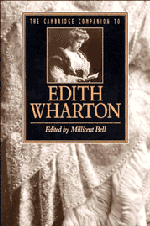Book contents
- Frontmatter
- Introduction
- 1 The Social Subject in The Age of Innocence
- 2 Edith Wharton and the Science of Manners
- 3 Edith Wharton and Race
- 4 The Custom of the Country
- 5 The Female Conscience in Wharton's Shorter Fiction
- 6 Law, Language, and Ritual in Summer
- 7 The House of Mirth
- 8 The Fruit of the Tree
- 9 The Valley of Decision
- 10 Edith Wharton's Valley of Decision
- Bibliography
- Index
- Series List
7 - The House of Mirth
The Bachelor and the Baby
Published online by Cambridge University Press: 28 May 2006
- Frontmatter
- Introduction
- 1 The Social Subject in The Age of Innocence
- 2 Edith Wharton and the Science of Manners
- 3 Edith Wharton and Race
- 4 The Custom of the Country
- 5 The Female Conscience in Wharton's Shorter Fiction
- 6 Law, Language, and Ritual in Summer
- 7 The House of Mirth
- 8 The Fruit of the Tree
- 9 The Valley of Decision
- 10 Edith Wharton's Valley of Decision
- Bibliography
- Index
- Series List
Summary
What a book a devil's chaplain might write on the clumsy, wasteful, blundering, low and horribly cruel works of nature!
- Charles DarwinIt will soon be ninety years since Edith Wharton made her agreement with Scribner's Magazine to finish, and publish in serial form, a work which she had found troubling. The House of Mirth is a novel of New York society, the world she never completely discarded, though she declared she had given it up. Henry James, while praising the historical reenactments and Italian setting of Wharton's first novel, The Valley of Decision, crisply advised her “in favor of an American subject.” The Master proposed she “Do New York,” and Mrs. Wharton proceeded to deal it out to a society she understood to be a narrow slice of the American scene. From Lawrence Selden's opening encounter with Miss Lily Bart in Grand Central Station, we anticipate that the novel will occupy the familiar territory of custom and constraint that amused and angered Wharton. But the precision of Selden's view of Lily Bart “as wearing a mask of irresolution which might . . . be the mask of a very definite purpose,” and Lily's shrewd use of him - “What luck! . . . How nice of you to come to my rescue!” - sets in motion a game of hide-and-seek that these two will play to the bitter, open end.
- Type
- Chapter
- Information
- The Cambridge Companion to Edith Wharton , pp. 137 - 156Publisher: Cambridge University PressPrint publication year: 1995
- 7
- Cited by

